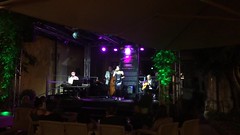Internet and the Digital world are great, no doubt. Sometimes, though, we are confronted with the thin line that borders the realms of the virtual and the earthly. I was discussing with my daughter about the issues around the printed book and the digital ebook. A beautiful example of that conflict follows, and it was not that obvious -at least to me.
For the first time ever I don’t need to go to Italy -or some rare bookstores in New York- to buy Italian books. Through Amazon or Apple’s iBook services I can get the very books that bookstores are selling at any moment in Italy with no hindrance, and with all the easiness of the electronic format and download. I see in this a tremendous advantage, indeed. And of course, the other good features of the ebook are there: mobility, access to other services (annotation, inline dictionary, portability across devices), etc. Last, with ebooks there are no regional format standards like with DVDs (the regions) or streaming movies. Ebooks can be acquired from anywhere!
So, welcome ebook. Yet, I was also looking at my beautiful and chaotic bookshelves at home. I love to pass through my books and actually see them. See where are those which I liked most, those which I am going to read next, etc. When I visit another house, the first thing I look at is the bookshelves. My friends won’t be able to peruse the books I love. So, I was thinking: When I buy ebook, there’s not going to be any shelves, right? That thing is lost. Of course, I can share with friends through Goodreads or any other social reading service, and I do. But what about those friends who are not much into the Web?
The truth is, again, it’s an experience lost. There’s a thin line dividing the two technologies, and no matter what side of the line I’m staying at –often I do jump from side to side!- there is going to be something deeply different on that side.
Another source of thought came after reading that Amazon.com wants to get the top-level Internet domain .amazon. But Brazil thinks different, and it certainly has got rights to claim the .amazon name to represent literally the commonly associated meaning of that word, namely, the Amazon forest. The same is happening with .patagonia, which is being claimed by the sportswear retailer Patagonia while the Argentinean government protests and tries to claim as its own because, after all, Patagonia is a region within Argentina (and also Chile)
. Who will win? Is Brazil the “legitimate” “owner” of the word “amazon”? Could Amazon.com be allowed to buy the name from Brazil or is the sole possibility of it a paradox? Does it even make sense to talk about an “owner” of a world resource?
My point for the moment is that these are just tiny examples of the two worlds colliding. In nice ways –because these battles are fought in the dark, out of the sight of people!








